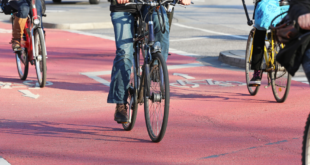New consumer research has shown support for e-scooters to be accepted for use on public roads, provided they’re not allowed on the pavement as well.
E-scooters are not currently legally allowed to be used on public roads and can only be used on private land. When asked, “Given the current risks of using public transport, and the need to avoid excessive car use, would you support making the use of e-scooters legal?”, just over 53% supported the change, however, when those who opposed a rule change were asked whether they would support a change provided e-scooters weren’t allowed on pavements, total support went up to 63%.
Commuters, students, homemakers and those out of work but looking for work were most supportive of a change to current legislation, whilst the retired population are least supportive.
When asked whether they’d support their local town running a trial, 57% said yes, with Scotland showing the strongest support at nearly 65%. Those who opposed a local trial were asked the same follow up question, would they support it if e-scooters weren’t allowed on pavements, and this shifted overall support up over 65%.
Tom McPhail, director of Public Affairs at Pure Electric, said: “It’s clear any change in the law has to be accompanied by proper controls to make sure e-scooters are safe and that everyone is comfortable with their use, especially pedestrians. It’s also clear they’re going to be popular, with towns and cities that participate in a trial likely to get a boost from the low-cost and environmentally-friendly mobility that e-scooters provide.”
There was also strong support for private scooter ownership, rather than on-street rentals. When shown sample costs of buying an e-scooter and renting one on the street, over 75% who expressed a preference said they would buy their own.
“Given current concerns about any form of shared transport and Covid-19 infection risks, combined with the freedom to use an e-scooter from your front door, it’s hardly surprising people prefer to own their own scooter rather than rent one off the street,” McPhail added.
The DfT is currently fast-tracking rules for e-scooter trials, having opened them up to any town in the UK to apply for permission to run one. Local authorities can obtain an exemption meaning e-scooter use will be legal on public roads within a defined geographical area, agreed with the DfT. Only e-scooters approved by the DfT as part of the trial will be legal for use on public roads. Only rented e-scooters will be allowed in the trials and they will be subject to tight approval requirements, such as speed limiters. Trials are expected to be up and running by the end of August and are planned to run for 12 months.
In order to meet the trial requirements, Pure Electric is developing a unique ‘long lease’ model, whereby users would rent an e-scooter for an up-front sum. In effect, they would then own the e-scooter and would be free to take it home for their personal use. At the conclusion of the trial, ownership of the e-scooter will pass to the user and they get to keep it. The DfT has confirmed this rental model will be acceptable within the trials.
Read the latest edition of BikeBiz below:
 BikeBiz Bicycle and cycling retail news
BikeBiz Bicycle and cycling retail news




